In holding ‘On these steps’, the all-Ireland denomination wanted to mark the centenaries by acknowledging the role that its College played in the momentous events of 100 years ago. The Church also had a broader aim beyond the commemorative, in that it sought to create space to hear different perspectives and build relationships, by bringing people together to reflect on the island’s past, while looking in hope to a shared future.
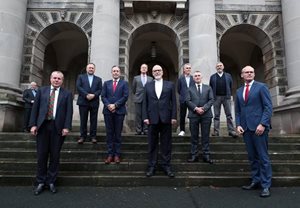 Recognising the diversity of views around this significant anniversary, the Church invited civic and political representatives from across the UK and Ireland, including Ireland’s church leaders, who heard the Moderator, Rt Rev Dr Bruce, give a reflective address that spoke to all traditions represented at the event. Ian McBride, the Foster Professor of Irish History at the University of Oxford, brought a historical perspective. The Principal of Union Theological College, Rev Professor Gordon Campbell, welcomed guests to the event and acted as MC.
Recognising the diversity of views around this significant anniversary, the Church invited civic and political representatives from across the UK and Ireland, including Ireland’s church leaders, who heard the Moderator, Rt Rev Dr Bruce, give a reflective address that spoke to all traditions represented at the event. Ian McBride, the Foster Professor of Irish History at the University of Oxford, brought a historical perspective. The Principal of Union Theological College, Rev Professor Gordon Campbell, welcomed guests to the event and acted as MC.
Political reflection also played a key part in proceedings, with a panel discussion hosted by the journalist and broadcaster Judith Hill. Panellists included Northern Ireland’s First Minister, Paul Givan MLA and Junior Minister, Declan Kearney MLA, representing the deputy First Minister Michelle O’Neill, who was unable to attend. Newly appointed Minister of State for Northern Ireland, Rt Hon Conor Burns MP, also took part along with Ireland’s Minister for Foreign Affairs, Simon Coveney TD.
In his wide-ranging and thought-provoking address, that was both challenging and hope filled, Dr Bruce drew on his own personal experiences of growing up in Lurgan, both through division and friendship. He also painted a prophetic picture of what he thought it would take to build something new, the creativity that is required in reworking and reshaping ‘the clay of this place’, which he said is a ‘unique mix’. It was, however, a future that he said was undeniably in the hands of everyone on the island of Ireland, especially those who were prepared ‘to get their hands dirty’. At the heart of that future, is reconciliation.
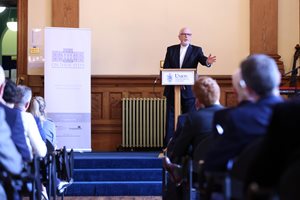 During his address the Moderator spoke of the different journeys travelled when it comes to the centenaries, and how like many of the communities across Ireland, these journeys often meet at a crossroads. “There are those who lament the creation of the border on this island, seeing it as an act of political compromise undermining the cause of Irish unity, and condemning this island to a further century of violence and sectarian polarisation. There are others who will wish to celebrate the partition of Ireland as a triumph of statecraft; a necessary act of political expedience to honour the democratic wishes of the majority in these six counties,” he said.
During his address the Moderator spoke of the different journeys travelled when it comes to the centenaries, and how like many of the communities across Ireland, these journeys often meet at a crossroads. “There are those who lament the creation of the border on this island, seeing it as an act of political compromise undermining the cause of Irish unity, and condemning this island to a further century of violence and sectarian polarisation. There are others who will wish to celebrate the partition of Ireland as a triumph of statecraft; a necessary act of political expedience to honour the democratic wishes of the majority in these six counties,” he said.
Recognising the reality of mistrust, division and the violence once endured, Dr Bruce asked the question that goes to the heart of the matter “… does the gospel provide a basis for hope for the future as we stand at this crossroads, regarding each other across the way, 100 years on? There are some things we will never be able to forget, and indeed which we must try not to forget. Victims of violence who have lost loved ones still seek justice, however unlikely such recourse through the courts might be. To remove that from them is to remove hope, and is antithetical to the gospel, which unites both love and justice in the person of Jesus Christ.”
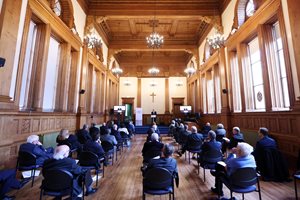 Dr Bruce explained that the Christian understanding of reconciliation rests upon the coming together of both love and justice: love sent Christ to be with us and justice sent Christ to the cross – both were needed to reconcile us to God.”
Dr Bruce explained that the Christian understanding of reconciliation rests upon the coming together of both love and justice: love sent Christ to be with us and justice sent Christ to the cross – both were needed to reconcile us to God.”
“Reconciliation is not soft or forgetful. Setting the past aside as if it didn’t happen is no basis or foundation for healing. Reconciliation that has the grit and grip to re-write a life is that which names a wrong as the wrong that it is, whether perpetrated by the state or by an agent of terror. Such naming and then acknowledgement of a wrong presents a choice to those at the table. If they have the courage and good sense and moral backbone to repent of it, to lament that it ever took place, to say so and face the guilt that lies at its heart, then a door is opened to a new future….” he said.
“…God’s vision for us is that we, friends and enemies alike, can sit together and eat together at the table. The people who get this are deeply impressive and unforgettable when we encounter them, and we on this island have a disproportionately large number of them to celebrate…”
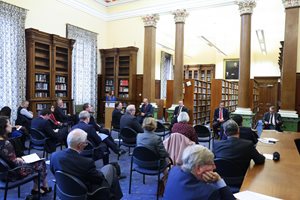 Speaking of another table, Dr Bruce said, “The power-sharing arrangements which exist here [in Northern Ireland], while not by any means perfect, are precious. They are a table around which we will find political friends and foes, and that in itself is a prophetic instrument which we need to protect…”
Speaking of another table, Dr Bruce said, “The power-sharing arrangements which exist here [in Northern Ireland], while not by any means perfect, are precious. They are a table around which we will find political friends and foes, and that in itself is a prophetic instrument which we need to protect…”
“North, south, east and west on these islands present us with a web of opportunities to grow – economically, culturally, spiritually, if we have the vision for it. In a post-Brexit, Protocol environment some of this has been made more complicated, but if anything it has been made more urgent. We must work tirelessly to sort out the new configurations of our cultural, commercial and spiritual connections. No shortcuts. No quick fixes. No buck-passing. Just gritty determination to get the detail done.”
In conclusion, Dr Bruce said, “A multi-cultural Ireland, north and south is a blessing to us, and we need not be fearful of it. The stories of those who have left everything behind in their homelands to be part of our story in this, their new homeland, need to be heard, and they will enrich us, just as we will bless them…Whatever a new Ireland resembles, it will not be because someone was victorious, while another was defeated. If it looks like that, it won’t be a new Ireland…”
During the event, which was livestreamed, guests were treated to the premier of a specially commissioned song for the event by the Belfast-based indie singer-songwriter, Ferna. They also heard King George V’s address to the opening of the Parliament, spoken by local actor Jim Allen.
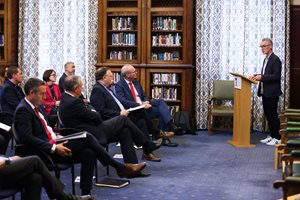 In his wide-ranging address, which included historical assessment alongside contemporary reflective and observations, Professor McBride suggested that those who had gone before were not motivated only by inherited prejudices, but their beliefs and values were shaped by the Great War, which found many parallels in the Europe of the day.
In his wide-ranging address, which included historical assessment alongside contemporary reflective and observations, Professor McBride suggested that those who had gone before were not motivated only by inherited prejudices, but their beliefs and values were shaped by the Great War, which found many parallels in the Europe of the day.
“One useful function of historians is to remind us that our predicaments are rarely as unique as we think. The unprecedented strains created by the Great War not only split apart the union of Britain and Ireland; they also brought about the collapse of the great continental empires…
“The new states of Poland and Czechoslovakia were established, Romania was enlarged…and the area around Smyrna (modern Izmir) was awarded to the Greeks. In all these cases, as in Ireland, the wishes of the inhabitants collided with strategic interests and with local political and economic circumstances,” he said. Quoting the European historian Mark Mazower, Professor McBride said that that “…the Paris peace settlement of 1919-1923 gave sixty million people a state of their own; but it also turned 25 million people into ‘minorities’.”
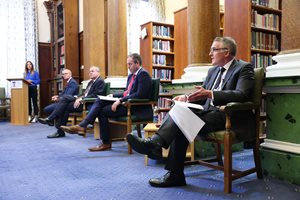 From the outset Professor McBride said that there was no easy answer to the question ‘How can we find constructive ways of commemorating the creation of Northern Ireland 100 years ago?’ He told those gathered in the Gamble Library, the seat of the old House of Commons from 1921 to 1932, that, “The partition of Ireland was a flawed attempt to reconcile the aspirations of Unionists and Nationalists. The responsibility for its failures lies with decision-makers in Belfast, in London and, to some extent, in Dublin also.
From the outset Professor McBride said that there was no easy answer to the question ‘How can we find constructive ways of commemorating the creation of Northern Ireland 100 years ago?’ He told those gathered in the Gamble Library, the seat of the old House of Commons from 1921 to 1932, that, “The partition of Ireland was a flawed attempt to reconcile the aspirations of Unionists and Nationalists. The responsibility for its failures lies with decision-makers in Belfast, in London and, to some extent, in Dublin also.
“In many respects the constitutional settlement of 1920-22 was the antithesis of the peace process of the 1990s…A century ago, neither Unionists nor Nationalists were capable of recognising the legitimacy of each other’s political allegiances. Each regarded the historical and cultural traditions of the other as invalid, or at least as misguided,” he said.
At the same time Professor McBride observed that, “The political and social forces working in favour of partition were very powerful. Nobody had a coherent or obviously workable alternative…Over the decades the mechanisms of denial and evasion became habitual, the rationalisations more practiced, and ‘whataboutery’ became a competitive sport.
“My hope is that, in this centenary year, we can collectively interrogate some of these self-serving reflexes…The challenge for historians, among others, is to ensure that the complex realities of the Irish situation a century ago are not ironed out for political, ideological or therapeutic reasons.”
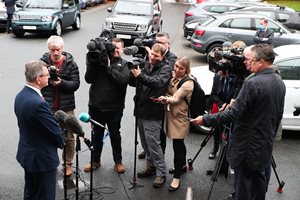 Having spoken about the ‘challenge for historians’, Professor McBride concluded his address by quoting the renowned Irish historian, David Fitzpatrick, when he said that task of the historian is to ‘raise awkward issues and, above all, seek to broaden the terms of debate’.
Having spoken about the ‘challenge for historians’, Professor McBride concluded his address by quoting the renowned Irish historian, David Fitzpatrick, when he said that task of the historian is to ‘raise awkward issues and, above all, seek to broaden the terms of debate’.
“We should bear in mind Fitzpatrick’s advice as we contemplate the centenary of Northern Ireland. ‘Far from avoiding all forms of judgement’, he suggested, historians should try ‘to add moral intensity to the ways in which we commemorate and comprehend the past’,” Professor McBride said.
Photos: (1) Principal participants on the steps of Union Theological College (1st row) Rt Hon Conor Burns MP, Northern Ireland Office Minister of State, Rt Rev Dr David Bruce, PCI's Moderator, Simon Coveney TD, Republic of Ireland's Minister for Foreign Affairs, (2nd row) Paul Givan MLA, First Minister of Northern Ireland, Declan Kearney MLA, Executive Office Junior Minister (back row) Rev Trevor Gribben, PCI's Clerk of the General Assembly, Professor Gordon Campbell, Principal of Union College, local actor Jim Allen (2) the Moderator addressing 'On these steps' from the College Chapel (3) guests in the Chapel (which once housed the Parliament's Senate Chamber) (4) Guests in the Gamble Library (the room where the Parliament's old House of Commons sat) (5) Ferna performs her song, while local actor Jim Allen gives voice to King George V's address to the Parliament (6) Judith Hill and the panelists (7) Sir Jeffrey Donaldson MP, who was a guest at On these steps, speaks to the media gathered outside the College
Montage (left to right) (1) Rev Trevor Gribben and the Moderator greet Conor Burns MP and Simon Coveney TD on the steps of Union College (2) the Moderator welcomes Most Rev Eamon Martin, Roman Catholic Archbishop of Armagh and the Church of Ireland Archbishop of Armagh, Most Rev John McDowell (3) Rev Dr Tony Davidson, convener of PCI's Peace & Reconciliation Panel who organised the event, and the Moderator welcoming Justice Minister Naomi Long MLA and (4) Rev Trevor Gribben greeting the Lord Mayor of Belfast, Councillor Kate Nicholl.
You can listen to Ferna's song 'Lapsed' here. You can also read the full address given by Dr Bruce here and Professor McBride's historical reflection here. The event was supported by the Department of Foreign Affairs Reconciliation Fund and will be followed by a series of webinars. The four-part series will seek to unpack ‘On these steps’ and its themes to the wider Irish Presbyterian community.
On these Steps was livestreamed from Union Theological College. You can watch the recording of the event, from 10 minutes & 35 seconds, here.